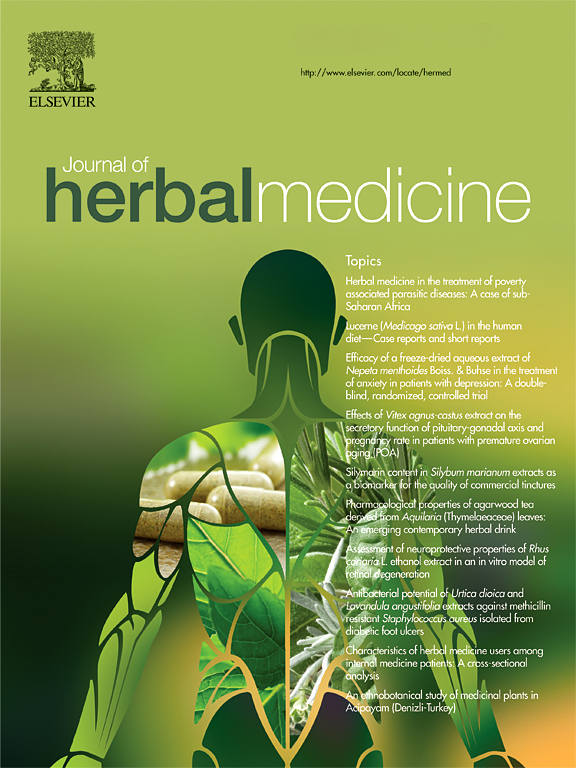Urtica dioica for benign prostatic hyperplasia
IF 1.9
4区 医学
Q2 INTEGRATIVE & COMPLEMENTARY MEDICINE
引用次数: 0
Abstract
Introduction
As of 2019, globally, there were 94 million prevalent cases of benign prostatic hyperplasia. This systematic review evaluates the effectiveness of Urtica dioica as a treatment of benign prostatic hyperplasia (BPH).
Methods
MEDLINE, Embase, CINAHL, the Cochrane Central Register of Controlled Trials (CENTRAL), Web of Science and ClinicalTrials.gov were searched from databases inceptions to February 2024. Randomized clinical trials (RCTs) investigating Urtica dioica (with or without usual care) for treating BPH in human subjects were considered. The GRADE approach was used to evaluate the certainty of evidence.
Results
Six RCTs with a total of 1210 patients met the inclusion criteria. Risk of bias of the included studies was mostly unclear or high. Meta-analyses showed that, compared with controls (placebo, usual care), Urtica dioica improved slightly BPH symptoms measured with the International Prostate Symptom Score (IPSS) at follow-ups of up to 12 months (standardized mean difference [SMD] -2.06, 95% confidence intervals [CI] [-3.22, -0.91] very low certainty evidence), reduced prostate specific antigen (PSA) levels (mean difference [MD] -0.37 ng/ml, 95% CI [-0.50, -0.23] low certainty evidence) but the interventions had little effect on quality of life (SMD -0.59, 95% CI [-1.57, 0.38] very low certainty evidence). The main reasons for downgrading the evidence were study limitations, inconsistency, and imprecision. All six studies reported adverse-effects; stating that none had occurred.
Conclusions
There is some promising evidence to support the effectiveness of Urtica in reducing the symptoms of BPH. Future, larger and more rigorous studies might reduce the existing uncertainties.
雄蕊荨麻疹为良性前列腺增生
截至2019年,全球共有9400万例良性前列腺增生。本系统综述评估了杜鹃花作为治疗良性前列腺增生(BPH)的有效性。方法检索medline、Embase、CINAHL、Cochrane Central Register of Controlled Trials (Central)、Web of Science和ClinicalTrials.gov数据库,检索时间从数据库建立到2024年2月。随机临床试验(rct)调查荨麻疹(有或没有常规护理)治疗BPH的人类受试者。GRADE方法用于评估证据的确定性。结果6项rct共1210例患者符合纳入标准。纳入研究的偏倚风险大多不明确或较高。荟萃分析显示,与对照组(安慰剂,常规护理)相比,在长达12个月的随访中,用国际前列腺症状评分(IPSS)测量的前列腺增生症状略有改善(标准化平均差[SMD] -2.06, 95%可信区间[CI][-3.22, -0.91]非常低的确定性证据),降低前列腺特异性抗原(PSA)水平(平均差[MD] -0.37 ng/ml, 95% CI [-0.50,-0.23]低确定性证据),但干预措施对生活质量几乎没有影响(SMD -0.59, 95% CI[-1.57, 0.38]非常低确定性证据)。证据降级的主要原因是研究局限性、不一致和不精确。所有六项研究都报告了不良反应;说明没有发生任何事情。结论本品在减轻前列腺增生症状方面有一定的疗效。未来,更大规模和更严格的研究可能会减少现有的不确定性。
本文章由计算机程序翻译,如有差异,请以英文原文为准。
求助全文
约1分钟内获得全文
求助全文
来源期刊

Journal of Herbal Medicine
INTEGRATIVE & COMPLEMENTARY MEDICINE-
CiteScore
3.90
自引率
0.00%
发文量
94
期刊介绍:
The Journal of Herbal Medicine, the official journal of the National Institute of Medical Herbalists, is a peer reviewed journal which aims to serve its readers as an authoritative resource on the profession and practice of herbal medicine. The content areas of the journal reflect the interests of Medical Herbalists and other health professionals interested in the clinical and professional application of botanical medicines. The objective is to strengthen the research and educational base of herbal medicine with research papers in the form of case studies, original research articles and reviews, monographs, clinical trials and relevant in vitro studies. It also publishes policy statements, opinion pieces, book reviews, conference proceedings and profession related information such as pharmacovigilance reports providing an information source for not only the Herbal Practitioner but any Health professional with an interest in phytotherapy.
 求助内容:
求助内容: 应助结果提醒方式:
应助结果提醒方式:


